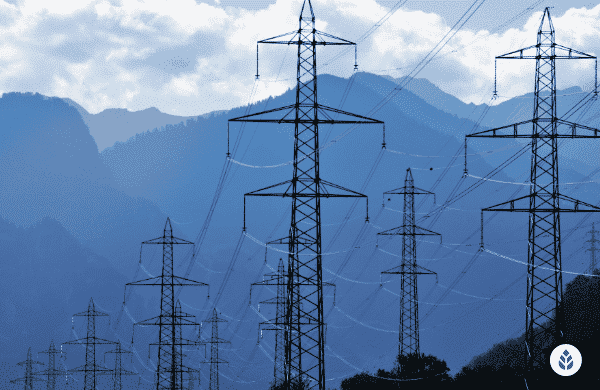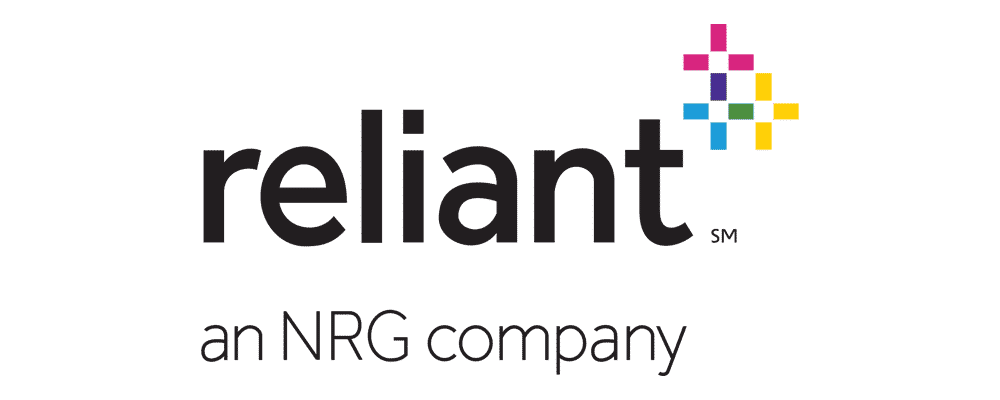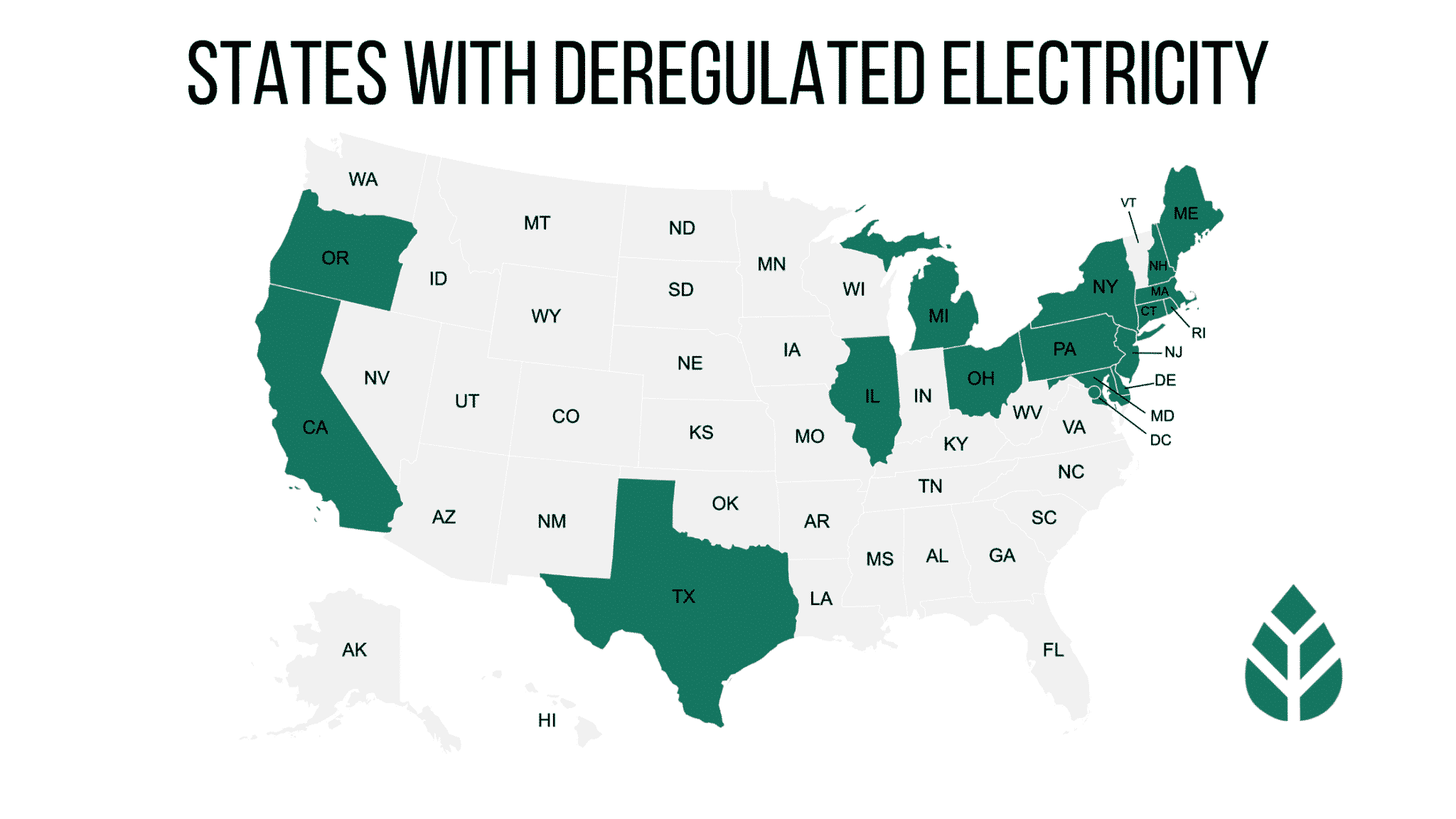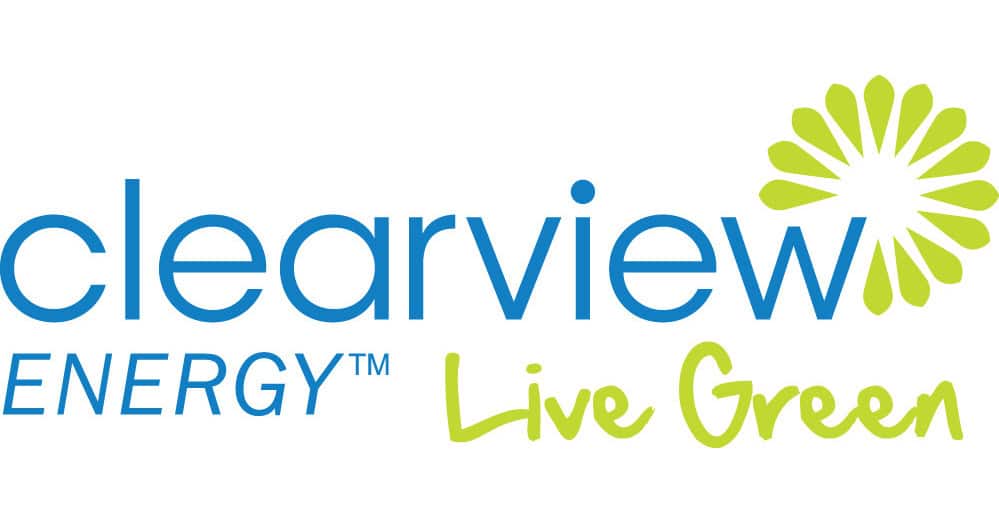

What Is Electricity Deregulation? (2024 Guide)
Here’s what we’ll cover in this guide:
- What is electricity deregulation? How does it work?
- Regulated electricity vs. deregulated electricity
- States with deregulated electricity
- Finding the best electricity providers in deregulated markets
Each product and or company featured here has been independently selected by the writer. You can learn more about our review methodology here. If you make a purchase using the links included, we may earn commission.
What Is Deregulated Electricity?
Electricity deregulation allows consumers to choose the company that supplies their energy. When you switch suppliers, how electricity is delivered to your home won’t change. Choosing a new electric supplier and/or plan gives you the ability to choose the best rates, energy sources and contract terms for your needs.
You can compare it to selecting an internet service provider — only certain providers are available in a given region, but you’ll likely have a choice between competitors, and each competitor will offer multiple plans to suit different needs and preferences.
Deregulated electricity markets allow competitors to enter (and exit) the market to buy and sell electricity by buying power plants and transmission lines. The aim of deregulation is to prevent monopolies, keep prices competitive and give consumers the power to choose plans suited to them.
Deregulation is intended to benefit everyday consumers — you can keep your rates low, support green energy and choose the term length and contracts best for you. But in a market with companies hungry for your business, consumers have to proceed with caution and make sure they understand all the terms of the plans they’re signing on to.

Constellation Energy

Nationwide Service
Average cost
Pros
- Many years of experience
- Great industry reputation
- Award-winning company
- No.1 producer of carbon-free energy in the U.S.
- Makes charitable contributions
Cons
- Charges contract cancellation fees
- No prepaid or no-deposit plans

Gexa Energy

Statewide Service
Average cost
Pros
- Many years of experience
- Great industry reputation
- Makes charitable contributions
- Low rates
- Wide variety of contract term options
Cons
- Charges contract cancellation fees
- No prepaid or no-deposit plans
- Slightly high number of complaints versus competitors

Reliant Energy

Statewide Service
Average cost
Pros
- Low number of customer complaints
- Makes charitable contributions
- Award-winning company
- Wide variety of plan options
- Many years of experience
Cons
- No satisfaction guarantee
- Charges contract cancellation fees
How Does Energy Deregulation Work?
In deregulated markets, companies offer a range of energy plans with competitive prices, energy source choices and terms. The intent is for competition between businesses to incentivize efficiency — if a company operates with lower overhead, it can offer lower rates and attract more business.
Let’s define the difference between a utility and an electricity supplier.
Utility
Utilities can be either private, investor-owned companies (investor-owned utilities or IOUs) or can be operated by government entities. Either way, they are regulated by state public utility commissions (PUCs). An example of a government-operated utility is Seattle City Light, which is operated by the City of Seattle. ConEd (Consolidated Edison) is an IOU that operates in New York. Some communities, usually rural or remote ones, are served by cooperatives owned by the community.
Making and getting power to homes, businesses and other end users consists of three stages: generation, transmission and distribution. Utilities are responsible for the distribution portion and are responsible for maintaining the distribution network — the poles, lines, meters and other infrastructure that get power to its final destination. You don’t have a choice over which utility will serve you.
Electricity Supplier
Electricity suppliers, often referred to as third-party suppliers, purchase electricity on the wholesale market and sell it to customers at the lowest possible rate. No matter which supplier you purchase electricity from, it will be delivered by your utility, which is responsible for the reliability of your electricity — for example, frequency and length of power outages.
If you live in a deregulated energy state and can choose your supplier, you can likely do so without even requiring a visit from the company to your home or business.
Check out this video for some of the basics of deregulation.
The Quick Background on Electricity Deregulation
Electricity deregulation is not a new concept. The original energy markets of the late 1800s and early 1900s were deregulated for the most part, and individual electric companies competed for business.1 At the time, though, the aggregate electricity supply in the U.S. was quite small. It wasn’t until the electricity infrastructure experienced growing pains that the need for regulation and restructuring became an issue — the sheer scale of the power grid’s expansion required the oversight of a national entity to prevent blackouts, create energy efficiency and provide reliable electric power. Here’s a brief timeline:
- 1935: During the Great Depression the federal government stepped in to regulate a growing market. Roosevelt’s New Deal included huge investment in organizing electric infrastructure, and Congress passed the Public Utilities Holding Company Act (PUHCA) giving the Securities and Exchange Commission authority over the corporate structures of public utilities and energy supply. Under the PUHCA, public utilities were regulated by U.S. states or larger geographic areas.2
- 1974: The 1970s energy crisis was caused by a global oil shortage, skyrocketing the price of energy. During the crisis, high energy prices fell on the shoulders of consumers. The U.S. Department of Energy was established to manage the country’s electricity supply.3
- 1977: The Federal Energy Regulatory Commission (FERC) was created by the Department of Energy to determine if wholesale electricity prices were unjust and unreasonable and, if so, to regulate pricing and order refunds for overcharges to ratepayers.4
- 1992: By the 1990s, most current public infrastructure was in place. In an effort to keep prices low and develop alternative sources of energy, in 1992 policymakers passed the National Energy Policy Act, which allowed for private market competition in the context of wholesale electricity generation.5
- 1996: Order 888 on the National Energy Policy Act required the separation of power generation from power transmission. That opened the way for transmission services to step in to the market as private entities and incentivized them to keep costs as low as possible.6
By the early 2000s, several states — most notably Texas, Pennsylvania and New York — had adopted at least partially deregulated electricity markets. In these states, power providers purchase electricity from power producers then set the tariff at which they sell that electricity to the public. As of 2022, 15 states have some form of electricity deregulation. A number of others have also deregulated natural gas.
Regulated Electricity vs. Deregulated Electricity
Simply put, consumers don’t get to choose an electricity supplier in regulated markets. In deregulated markets, consumers can usually choose between a selection of suppliers in their area or in some cases, stay with the default plan from their utility company. There are a few more nuances to it though.
Regulated Electricity Market
A regulated electricity market means that many, but not all, local utilities own and operate all aspects of electricity supply, including:
- Power plants
- Transmission lines and poles
- Delivery of electricity
- Billing and customer service
- Share of renewable electricity
In regulated markets, electric utilities are overseen by PUCs, which set the rates, fees and other services within the power industry.
| Regulated Electricity Pros | Regulated Electricity Cons |
| More statewide environmental oversight and regulation | Monopolies can develop when improperly regulated |
| Centralized planning and maintenance increases reliability | No choice for consumers to choose 100% renewable energy, though many utilities’ plans incorporate renewable energy |
| Easier to offer low-income assistance | Less public awareness surrounding energy |
Deregulated Electricity Market
In deregulated areas, retail electricity providers perform the following functions:
- Purchase electricity in the wholesale market and supply it to individual customers
- Set the rates, terms and conditions of an electricity contract
State PUCs regulate electricity suppliers to some extent, but it varies by region. Utilities and distribution are still fully regulated by PUCs.
| Deregulated Electricity Pros | Deregulated Electricity Cons |
| Promotes innovation of energy products | More difficult to manage power supply |
| Competition drives lower prices | More confusion for customers |
| Consumers can choose source of electricity | No incentive for environmental protection aside from meeting customer demand for green energy/renewables |
States With Deregulated Electricity
There are currently 15 states that offer some form of electricity deregulation. Deregulated energy structures don’t look exactly the same state by state, however. In some states, we found that only small regions offered multiple choices for electricity. In others, electricity markets are technically deregulated, but have struggled to gain a foothold in the state. Other states have legislation surrounding deregulation that is still in flux.
The green-shaded states in the map below offer some form of deregulation in their electricity markets.
- California
- Connecticut
- Delaware
- Illinois
- Maryland
- Maine
- Massachusetts
- Michigan
- New Hampshire
- New Jersey
- New York
- Ohio
- Oregon
- Pennsylvania
- Rhode Island
- Texas
Finding the Best Electricity Providers in Deregulated States
If you live in one of the 15 states with deregulated energy markets, you likely have a choice in your energy supplier and different plans the suppliers offer. You might want a supplier that provides clean energy, or you may simply want a provider with a lower rate.
The EcoWatch team is here to help. We’ve narrowed down the top clean-energy providers in specific deregulated states, and by using this tool or clicking the links below, you can compare prices and find the right plan for you.
Karsten Neumeister is a solar energy specialist passionate about sustainable development, environmental and cultural change. Before joining EcoWatch, Karsten worked in the energy sector of New Orleans, focusing on renewable energy policy and technology. A lover of music and the outdoors, Karsten might be found rock climbing, canoeing or writing songs when away from the workplace.

 233k
233k  41k
41k  Subscribe
Subscribe 







